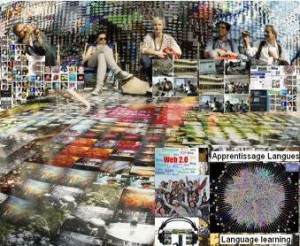Les réseaux sociaux peuvent jouer un rôle décisif dans le domaine de l’enseignement d’une langue étrangère, car ils favorisent la communication réelle, le travail collaboratif entre apprenants, entre classes et entre enseignants , ainsi que le développement des échanges et contacts interculturels.
«Members of online communities learn by making and developing connections (intentionally or not) between ideas, experiences, and information, and by interacting,sharing, understanding, accepting, commenting, creating and defending their own opinions, their view points, their current situations and their daily experiences.
Online communities allow, form, guide, foster, and stimulate connections. Learning in online communities takes place through storytelling, making jokes, giving examples, linking and making available different resources, asking questions, providing answers, developing empathy, and simply reading, to list a few examples. Communities provide the context, resources and opportunities to expand the members’ horizons and awareness of themselves and of other members. Personal development goes hand-in-hand with other forms of learning, such as knowledge and skill acquisition for practical and professional aims» (Aceto et al. 2010).
RESSOURCES – Studies
Pedagogical Innovation in New Learning Communities: An In-depth Study of Twelve Online Learning Communities. Aceto, S., Dondi, C., Marzotto, P., Ala-Mutka, K.& Ferrari, A. – European Commission JRC http://ftp.jrc.es/EURdoc/JRC59474.pdf
Learning in Informal Online Networks and Communities – K. Ala-Mutka
http://ftp.jrc.es/EURdoc/JRC56310.pdf
Language learning and social media (elearningeuropa.info) – Resources
http://www.elearningeuropa.info/main/index.php?page=fix&id=41
Réseaux sociaux en Education Evaluation – Social Networks in Education
http://flecampus.ning.com/profiles/blogs/reseaux-sociaux-en-education
Réseaux sociaux et Apprentissage des langues
http://flenet.canalblog.com/archives/2009/08/03/14252673.html
Educational Networking – S. Hargadon
http://www.educationalnetworking.com/
Etude sur l’impact des technologies de l’information et de la communication (TIC) et des nouveaux médias sur l’apprentissage des langues (EACEA 2007/09) http://eacea.ec.europa.eu/llp/studies/documents/study_impact_ict_ne…
Educational Social Networks Evaluation Form Checklist – Réseaux Educatifs Grilles Evaluation http://www3.unileon.es/dp/dfm/flenet/grillesnetworks.html#french
BLOGS / RÉSEAUX / Web 2.0 – Education
http://flenet.rediris.es/blog/carnetweb.html
Source: Apprentissage des langues et Réseaux Médias Sociaux – Language learning and social networks
http://flecampus.ning.com/profiles/blogs/apprentissage-des-langues-et
CONTACTS
CampusFLE http://twitter.com/campusFLE
RadioFLE http://twitter.com/radioFLE

